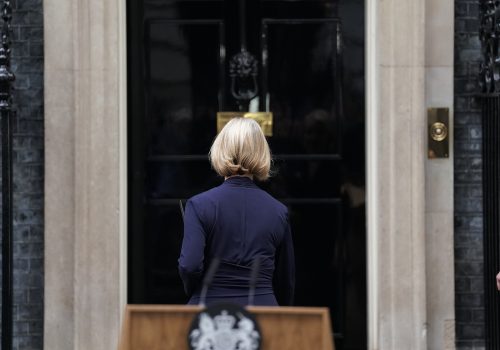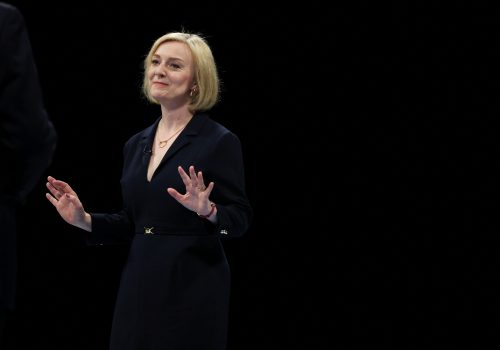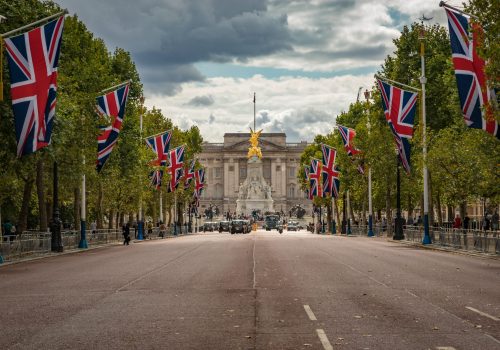Can Britain pull out of its political turmoil?
JUST IN
In Liz, they no longer trust. UK Prime Minister Liz Truss resigned on Thursday, after just forty-four days in office, continuing the political upheaval that has roiled Britain in recent months. As the Conservative Party—which rebelled against her leadership following a tax-cut plan that sent markets plunging—prepares to name a new prime minister next week, what will it take to right the ship of state? Could a Brexit reversal be on the table? You can always trust our experts to bring the insight.
TODAY’S EXPERT REACTION COURTESY OF
- Frances Burwell (@FranBurwell): Distinguished fellow at the Europe Center
- John M. Roberts: Nonresident senior fellow at the Global Energy Center
- Peter Westmacott (@PeterWestmacott): Distinguished ambassadorial fellow at the Europe Center and former British ambassador to the United States
- Livia Godaert (@liviagodaert): Nonresident fellow at the Europe Center
Briunion?
- Thursday’s dramatic developments offered another data point, Fran tells us, in Britain’s “devolution towards becoming a less relevant partner for the United States and its European allies.” She says that process can be attributed to the “civil war” over Brexit within the Conservative Party that dates to 2013, when the referendum was first announced—and the “deception” of pro-Brexit leaders who “maintained that constructing barriers with Britain’s largest economic partner would not have any serious consequences.”
- And now, six years after British voters chose to leave the European Union (EU), John predicts that we may start to see Conservative and Labour politicians discussing whether Britain should try “to regain access to the single European market, even if they no longer aspire to full EU membership.”
- In recent years, even those who supported the “remain” cause have been hesitant to talk of reversing Brexit. “But as the United Kingdom’s politics and economy have turned head over heels in the last few weeks, maybe this last taboo will be broken,” John notes.
Not great
- Peter laments that the United Kingdom has become “a source of amusement, disbelief, pity, and schadenfreude abroad. It’s humiliating for a country which has for so long been a model of functioning democracy.”
- It also appears to have become an unreliable partner. While “the same wheels will keep turning” with respect to Britain’s global presence under the next prime minister, Livia says, “alliances and partnerships are built on trust—trust that an ally will answer when called, but also trust from within. This latest political crisis deals a blow to the UK’s international relationships, but it is also a blow to national self-confidence.”
- Livia adds that amid this persistent political and economic instability in the country, “we can expect a rise in nationalist and independence movements in the coming months” within the United Kingdom.
- Without a strong economy to support robust defense spending, Fran says, the United Kingdom can’t maintain its lead role in supporting Ukraine. “In the White House corridors, officials must be wondering how much longer this British drama will continue and what it will mean for Britain’s contributions to meeting the current geopolitical challenges,” she says.
Who’s up next?
- The oddsmakers favor Rishi Sunak—the runner-up to Truss in this summer’s Conservative Party contest—to take over at 10 Downing Street following a vote next week among members of Parliament. Leader of the House of Commons Penny Mordaunt is also in the mix. But Peter says it’s “not impossible” that we could witness the return of Boris Johnson, who quit his own scandal-scarred premiership less than four months ago.
- While Johnson does retain considerable support among the Tories, John points out that a Boris comeback “would probably prove incredibly divisive both in the party and in the country at a time when all candidates will be calling for stability and unity.” One possible unity candidate? Defense Secretary Ben Wallace, according to John, “is one of the few ministers with a consistently respected reputation under different Conservative administrations.”
- What about Labour Party leader Sir Keir Starmer? Peter notes that Starmer is pushing for an early general election “on the grounds that whoever governs the country needs a democratic mandate.” But the Conservatives are “unlikely to agree since the polls overwhelmingly favor Labour.”
Further reading
Thu, Oct 20, 2022
Experts react: What the resignation of UK Prime Minister Liz Truss means for Britain and the world
Experts react By
Our experts tell us what this political shuffling means for the United Kingdom—and whether there's truly a "unity candidate" in the running to take the helm.
Mon, Sep 5, 2022
What should the world expect from Liz Truss?
Fast Thinking By
As Truss maps out her priorities, our experts weigh in on what to expect from London under her leadership.
Fri, Oct 8, 2021
Global Britain: An American review
Issue Brief By
What is happening to Britain in the world? Since 2016, when Brexit began with the United Kingdom’s shock “leave” vote to quit the European Union, the conversation has become almost impossible to have without entering into a fierce and polemical debate surrounding the country’s departure.
Image: British Prime Minister Liz Truss announces her resignation, outside Number 10 Downing Street, London, Britain October 20, 2022. REUTERS/Toby Melville


